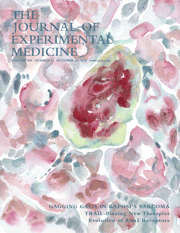J Exp Med:开发出有望阻止人再次吸烟的蛋白肽
2013-05-06 ZinFingerNase 生物谷
2012年10月24日来自加拿大多伦多成瘾和精神健康中心(Centre for Addiction and Mental Health, CAMH)的科学家们鉴定出一种潜在新的方法来阻止人们再次吸烟。在当前的治疗方法中,吸烟者试图戒烟,但是经常不能成功。 加拿大CAMH坎贝尔家庭心理健康研究所资深研究员和多伦大大学精神科教授Fang Liu博士说,“我们开发出一种蛋白肽( protein pep
2012年10月24日来自加拿大多伦多成瘾和精神健康中心(Centre for Addiction and Mental Health, CAMH)的科学家们鉴定出一种潜在新的方法来阻止人们再次吸烟。在当前的治疗方法中,吸烟者试图戒烟,但是经常不能成功。
加拿大CAMH坎贝尔家庭心理健康研究所资深研究员和多伦大大学精神科教授Fang Liu博士说,“我们开发出一种蛋白肽( protein peptide)。利用它,人们可能开发一种新类型的高度靶向疗法来阻止再次吸烟。”
Liu博士和她的研究团队最初发现尼古丁暴露能够增强两类大脑受体---一种烟碱性受体(nicotinic receptor)和一种谷氨酸受体之间的结合。他们鉴定出这两种受体结合在一起的位点。利用这种信息,他们能够制构建出一种蛋白肽来破坏这两种受体之间的结合。
研究人员在吸烟复发的模式动物体内测试了这种蛋白肽。与期待中的一样,它能够减少这些动物去寻找尼古丁的企图。
这些发现有助于科学家们开发出抗吸烟的药物来直接阻止人们再次吸烟。研究人员希望它将导致科学家们为利用当前的戒烟药物不能取得成功的吸烟者开发出一种替代性方法。
与吸烟相关的拓展阅读:
- PLoS ONE:研究人员发现尼古丁减轻吸烟者焦虑的机制
- Coch Data Syst Rev:新型联合疗法助吸烟者成功戒烟
- JBC && BBRC:低水平肺蛋白Fut8增加吸烟诱导的肺气肿
- AACR:美国癌症研究协会限制癌症患者吸烟
- 吸烟者或成H7N9“易感人群” 中老年人暂不列为高危人群 更多信息请点击:有关吸烟更多资讯

The α7nACh–NMDA receptor complex is involved in cue-induced reinstatement of nicotine seeking
Smoking is the leading preventable cause of disease, disability, and premature death. Nicotine, the main psychoactive drug in tobacco, is one of the most heavily used addictive substances, and its continued use is driven through activation of nicotinic acetylcholine receptors (nAChRs). Despite harmful consequences, it is difficult to quit smoking because of its positive effects on mood and cognition that are strong reinforcers contributing to addiction. Furthermore, a formidable challenge for the treatment of nicotine addiction is the high vulnerability to relapse after abstinence. There is no currently available smoking cessation product able to achieve a >20% smoking cessation rate after 52 wk, and there are no medications that directly target the relapse process. We report here that the α7nAChR forms a protein complex with the NMDA glutamate receptor (NMDAR) through a direct protein–protein interaction. Chronic nicotine exposure promotes α7nAChR–NMDAR complex formation. Interestingly, administration of an interfering peptide that disrupts the α7nAChR–NMDAR complex decreased extracellular signal-regulated kinase (ERK) activity and blocked cue-induced reinstatement of nicotine seeking in rat models of relapse, without affecting nicotine self-administration or locomotor activity. Our results may provide a novel therapeutic target for the development of medications for preventing nicotine relapse.
本网站所有内容来源注明为“梅斯医学”或“MedSci原创”的文字、图片和音视频资料,版权均属于梅斯医学所有。非经授权,任何媒体、网站或个人不得转载,授权转载时须注明来源为“梅斯医学”。其它来源的文章系转载文章,或“梅斯号”自媒体发布的文章,仅系出于传递更多信息之目的,本站仅负责审核内容合规,其内容不代表本站立场,本站不负责内容的准确性和版权。如果存在侵权、或不希望被转载的媒体或个人可与我们联系,我们将立即进行删除处理。
在此留言








#Med#
37